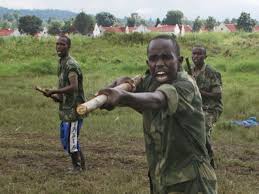
By Aaron Ross
KINSHASA (Reuters) – The Democratic Republic of Congo has told the United Nations that a re-emergence of the M23 rebellion in the east is endangering a deal with the opposition intended to lead to a presidential election this year.
President Joseph Kabila is meant to step down after the election under the agreement, which defused unrest prompted by his failure to step down as his mandate ended in December.
In a letter to the president of the U.N. Security Council, Congo’s ambassador to the United Nations, Ignace Gata Mavita, detailed a series of M23 incursions that began in November and accelerated last month.
“It goes without saying that this situation risks diverting the attention of the government, which would have to devote available financial means to face this war,” he wrote to Sweden’s Olof Skoog, the council’s president for January, in a letter dated Jan. 27 and seen by Reuters on Friday.
He said the fiscal strain would imperil the political agreement and “perturb the electoral process itself”.
Lack of money was one of the reasons cited by Kabila’s government for its failure to hold elections last year as scheduled.
M23 was eastern Congo’s most powerful rebel group until its defeat by Congolese and U.N. forces in 2013. Many of its fighters fled into neighbouring Uganda and Rwanda, where they have been kept in camps.
The rebels accuse Kinshasa of dragging its feet on promises to repatriate them under the terms of a peace deal.
The Congolese army this week said M23 fighters had captured four of the crew of a military helicopter that crashed, and that three had died after being tortured.
Gata Mavita asked the Security Council to condemn what he said was M23’s violation of the peace agreement. He also asked it to request that Rwanda and Uganda facilitate the return of rebels remaining on their territory to Congo for disarmament.
An M23 resurgence could spark wider conflict in a mineral-rich region that is an ethnic tinderbox straddling national regional borders, and has seen decades of war.
But any delay to this year’s election timetable could also reignite unrest in the capital Kinshasa, where dozens died last year during violent protests against Kabila.
The Catholic bishops who brokered the election agreement said last month that it could unravel unless politicians quickly reached compromises on its implementation, and the death of veteran opposition leader Etienne Tshisekedi on Wednesday has added a further element of uncertainty.
(Writing by Joe Bavier; Editing by Kevin Liffey)











